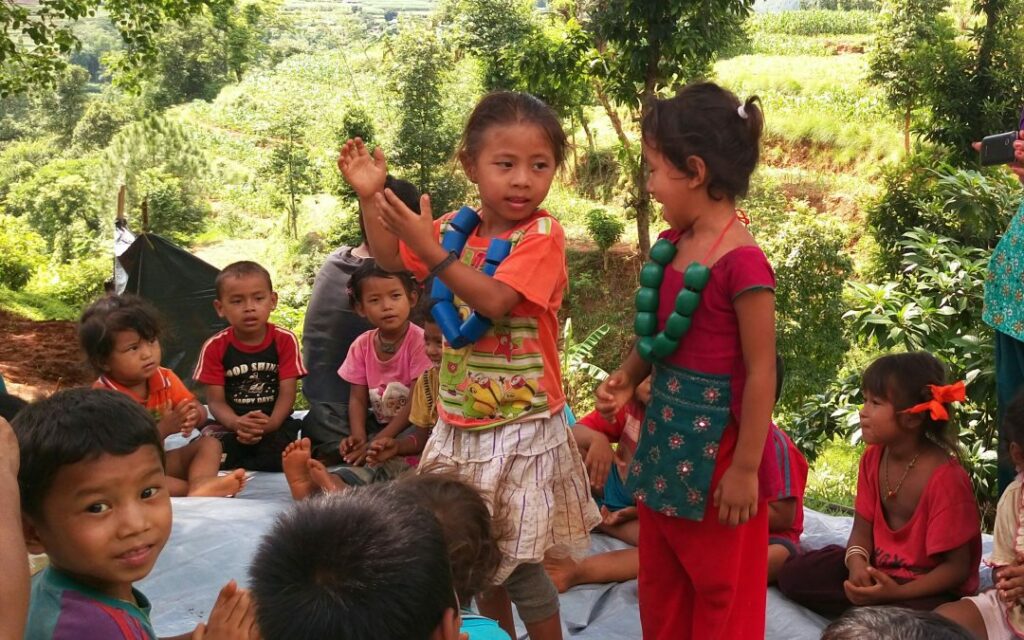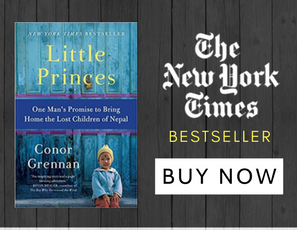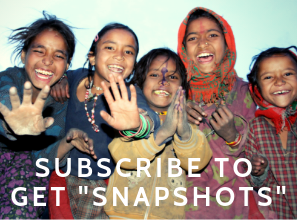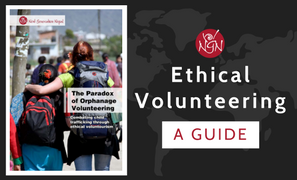Rising awareness of orphanage voluntourism
A decade ago very few people had heard of the term ‘orphanage voluntourism’, but now barely a week goes past without the media covering it. For anyone who is unaware of what orphanage voluntourism is, it involves well-intentioned volunteers who give their time and money to orphanages in the belief they are helping vulnerable children. But without realising it, their willingness to do this is actually creating the incentive for children to be unnecessarily separated from their families and put into profit-making orphanages. In addition to aiding a form of child trafficking, the volunteers’ support for orphanages reinforces an outdated and harmful model of residential childcare; exacerbates psychological attachment disorders in children having to cope with a rotating roster of hundreds of volunteer carers; opens the door to potential child abusers posing as volunteers; and undermines the local workforce. In short, supporting orphanages paradoxically harms children.
http://learningservice.info/the-orphanage-voluntourism-campaign-is-the-end-game-in-sight/
My own work on orphanage voluntourism began nearly a decade ago as the Country Director for Next Generation Nepal. We recognised that reunifying orphanage trafficked children with their families was only addressing symptoms, because for every child we took home another fifty were being trafficked into orphanages. So we set about documenting the problem and raising awareness of the link between orphanages, trafficking and volunteering in Nepal. By the time I left Next Generation Nepal in 2016, Nepal had joined Cambodia and other counties on the international map of orphanage voluntourism hot-spots. However, although we started a lively debate, in practice few travel and volunteering organisations had been convinced to withdraw from their orphanage programmes.
First they ignore you, then they laugh at you, then they fight you, then you win
I often think about the orphanage voluntourism campaign through the lens of the famous Gandhi quote: “First they ignore you, then they laugh at you, then they fight you, then you win”. For almost the first decade of the campaign, most travel and volunteering organisations were either ignoring or humouring us. But then on 21 August 2016 something pretty amazing happened – JK Rowling tweeted about orphanage voluntourism and the media went crazy. JK Rowling’s intervention shifted the debate from us being ignored and humoured, to being fought against, with travel and volunteering organisations publicly defending their practices and criticising us.
But their defence came too late, because the tipping point had already come. The inclusion of orphanage trafficking in the US TIP Report in 2017 and 2018 and in the Australian Modern Slavery Act further generated mass media coverage of the issue, and one by one travel and volunteering organisations began to withdraw from orphanages. The impressive list of these organisations on the ReThink Orphanages website is a testimony to this.
This year Hope and Homes for Children and ABTA launched an Orphanage Tourism Taskforce with several high profile tourism industry partners. Meanwhile, at the World Travel Market in London, travel and volunteering organisations were showcased on the responsible tourism child protection panel, talking about their own solutions to the problem. This begs the question – have we moved from Gandhi’s fighting stage, to finally winning the argument?
Whilst there is much to celebrate in terms of the progress we have made, sadly I do not believe we are in the end game just yet. Conversely, I think the next few years may be the most challenging of all, as the campaign diversifies to address multiple different types of stakeholder groups at different stages in their understanding and evolution away from orphanage voluntourism. So in this article, I set out my own thoughts on where we need to go from here. This is not intended as a comprehensive strategy, but simply some ideas – as someone who has been involved in this movement now for nearly a decade – on what we could do to make our campaign even more effective.
We need to return to the grassroots
The movement against orphanage voluntourism began at the grassroots with small organisations and campaigns operating in places such as Cambodia and Nepal, as well as to some extent the UK. However, in more recent years its focus has shifted predominantly to Australia, Europe and the United States. This has been for a very good reason: to influence legislation and policy in the countries where volunteers come from. Incredible progress has been made on this front, and there is still much work to be done to influence the policy positions of governments, donors, travel and volunteering organisations, educational institutions, faith-based organisations, and so on.
Yet, whilst this strategy is vitally important, there is also a risk that it puts too much emphasis on the assumption that policy will automatically shape practice on the ground where children are being harmed. Highly respected development anthropologist, Professor David Mosse, has shown that in reality policy does not influence practice in the way we expect. Mosse’s work convincingly demonstrates how those working at the grassroots use their agency to ignore, resist, adapt and reinterpret policy to suit more urgent demands from within their own context, and he argues that as development professionals we need to be more realistic about how this works.
Anyone who has spent significant time working at the grassroots, as I have, will have experienced the inevitable gap between policy and practice on the ground. So whilst I am giving talks at events in Europe, singing the praises of the Australian Modern Slavery Act and US TIP Report, my colleagues in Nepal tell me that most people on the ground are unaware of these policy developments, and sadly not much is changing yet. Or they tell me that where there is awareness of these developments, orphanages and volunteering organisations are using clever tricks to greenwash and re-package orphanages as ‘childcare centres’, ‘boarding schools’ or using other euphemisms, or they are reassuring supporters that they have found ways of making orphanage volunteering safe for children, and so on.
I have always had a perverse admiration for the ingenuity of traffickers (for example, the way they convincingly presented themselves to families as ‘child rights NGOs’ after the 2015 earthquake in Nepal). I know them well enough to know that they will keep finding innovative ways of making the orphanage business continue. My view is therefore that, while important policy work in the US and Europe must continue, we also need to turn our attention back to the countries where orphanage voluntourism is happening. I would like to see more resources allocated to small but highly effective grassroots organisations like Stahili Foundation in Kenya, One Sky Foundation in Thailand and Next Generation Nepal. These organisations are working directly with host governments, voluntourists and orphanage trafficked children, and they achieve a lot with very limited funds. When I donate to charities, this is where my money goes.
We need to be talking to Asian voluntourists
We need to start talking about the rising wealth of many Asian countries – such as China, Hong Kong, Singapore, Malaysia and India – and the corresponding increase of Asian tourists and voluntourists. China is already the leading country in the world in terms of outbound tourist expenditure, and by 2030 this is predicted to be double that of the United States. The evidence of a rising interest in voluntourism amongst affluent Asians is mounting, including, unsurprisingly, a desire to volunteer in orphanages. Yet the orphanage voluntourism movement is dominated by ‘Western’ agencies and thought leaders, and its campaigns are still mainly targeting ‘Western’ volunteers and organisations. This needs to change fast, or we risk winning the campaign in one part of the world whilst losing it in another.
We need to work with the ‘woke’ and ‘unwoke’
One of the challenges we now face are the vast differences in levels of understanding of this issue amongst our target audiences. For example, within the tourism industry, on one hand we are working with many self-professed ‘responsible tourism’ organisations who are 100% with us on disagreeing with orphanage tourism, and are already working on ethical alternatives such as engaging with children through community-based tourism. This group has moved well beyond the ‘Don’t Volunteer in Orphanages’ message and they want us to use our resources to help them safely transition from their orphanage programmes and design new ethical products. There is a strong moral justification for us to do this because, without our interventions, the so called ‘ethical alternatives’ could be equally as harmful to children. ReThink Orphanage’s soon-to-be-published divestment resource will be hugely helpful here. However, on the other hand, evolving research also from ReThink Orphanages suggests that there are still many volunteers and organisations completely unaware of this issue, which justifies the need for fresh campaigns telling people not to volunteer in orphanages – such as Lumos’ recent #HelpingNotHelping campaign.
We need to better recognise our privilege
Another challenge the orphanage voluntourism movement faces is that it is still dominated by privileged white Euro-American-Australian voices (like mine!), with an under-representation of voices from the places where voluntourism happens. This not only brings us uncomfortably close to neo-colonial critiques of the development sector as a whole, but in practical terms leaves us vulnerable to criticism by our detractors that we do not value the preferences of communities who say they want orphanages and voluntourists. There is also a danger that our narrative portrays less-developed countries as delinquent because they still have orphanages, while we portray ourselves morally superior because we say we ‘abolished orphanages many years ago’. There are two ways we need to address these concerns. First, we need to encourage and amplify voices from the Global South whose views resonate with ours – people like Stephen Ucembe and Ruth Wacuka from Kenya, Sinet Chan from Cambodia, and Rishi Bhandari from Nepal. Second, we need to be more honest that we have not really solved the orphanage problem in the Global North. Exposes in the UK into unregulated profit-making children’s homes associated with trafficking and abuse, and the profit-making inpatient healthcare economy which “turns people into commodities”, suggest that UK residential care is in fact not that different from the orphanage business in places like Cambodia or Nepal. Therefore, let’s acknowledge our privilege and our problems, and create a movement that recognises that we all have work to do in all our countries.
Sometimes we need to use the carrot and the stick
The default position of many organisations in our movement is that they do not name and shame. For the most part I wholeheartedly agree with this position. I like to believe that the majority of stakeholders propping up the orphanage business are not doing so out of disregard for children’s best interests, but they simply don’t understand the impact of their actions, or if they do, they don’t know how to change. Therefore playing the role of a critical friend to help these actors is usually the most effective strategy. However, there is a counter-argument that sometimes the stick can be just as useful as the carrot. For example, Human Rights Watch’s sensationalist expose of child abuse in Russian orphanages did certainly not endear them to the Russian government, but it is likely that it was influential in opening the door to less critical organisations to be invited in to help the Russian government to address its orphanage crisis. A recent quandary for some of us in our movement was the news of members of the British Royal Family endorsing a controversial orphanage, which also happens to run a voluntourism programme. When an institution as influential as the Royal Family supports orphanages, it is inevitably going to massively undermine our messaging. In this instance, however, after much internal discussion, most of us concluded that it was not worth talking about this publicly for fear of a backlash or reducing our chances of privately being able to start a dialogue with the Royal Family. I still think this was the right decision. However, judging by the impact organisations such as Human Rights Watch have had on rights-based issues, I sometimes wonder if there is a place for occasional sensationalist campaigning. In a social movement that represents a broad church of organisations with varying positions, is there a role for such an approach?
We need to communicate better with Generation Z
Let’s be honest: many of us from the early days of the orphanage voluntourism movement are getting older. In my younger backpacking days I would get my travel advice from a hardcopy of the Lonely Planet. But these days most Millennials and Generation Zs are influenced by very different mediums. I attended a ‘hackathon’ recently at a creative agency in London’s trendy Shoreditch district to help plan a new voluntourism campaign. Whilst there I discovered for the first time, from our hip young facilitator, that putting information on a website is consider ‘old school’ – instead, Instagram and YouTube is where potential young voluntourists will go to get their advice. “Is this guy for real?”, I can hear all under-30 year olds saying as they read this confession, but I can assure you I was not alone! Not only are communication mediums changing, but our style of communication needs to adapt to fit into short engaging soundbites, if they are to have any chance of being listened to by a younger generation bombarded by media messaging. For an issue as complex as orphanage voluntourism, this is a big challenge, and the only people who can help us rise to this challenge are young people themselves.
We need to embody the values we expect from volunteers
Much of our movement’s messaging is about telling voluntourists to search deep within themselves and consider their motives for volunteering, and to think of the best interests of children and families over their desires for adventure, ego-satisfaction and enhancing their CVs. We advise them to be open to learning and to work in collaboration with existing local projects. Yet we often don’t embody these values ourselves in our work. As anyone who works in the human rights’ sector will testify, we sometimes have a problem with ego and a lack of collaboration between like-minded organisations. Living around Buddhists for so many years has influenced my own thinking that if one’s motivation is pure, then the chances of success are much greater. Therefore I believe it is important for us to learn to quieten our egos and remember our own mantra that the best interests of the child are paramount (not the best interests of our organisation or our reputation). This is much easier said than done of course – and I struggle with it as much as anyone – but we have to try. Similarly, a few organisations in our fold have sadly become embroiled in scandals in recent years around bullying and harassment of staff. This is never acceptable: it undermines everything we stand for. We therefore have to truly embody the values we preach.
What happens next?
A decade has gone by from when a few brave activists in Cambodia began the conversation about orphanage voluntourism. We should take a moment to reflect on how far we have come since then, and give ourselves a pat on the back. But we are still a long way from the end game, and in fact the next few years promise to be as challenging, busy and exciting as it ever has been. We have to continue to build and embrace a diverse global movement of activists, from many different backgrounds and with radically different life-experiences, to speak to the plethora of international stakeholder groups whom we need to influence. And we need to learn to truly embody the values which we espouse. It will not be easy, but if you are anything like me, that’s exactly why we keep doing it.
Martin Punaks is an International Development and Child Protection Consultant, and the Strategic Advisor for Next Generation Nepal. He has been an active player in the global campaign against orphanage voluntourism for almost a decade, and he vows to continue playing his part until orphanage voluntourism is completely abolished. The main photo at the top of this article is copyright of Next Generation Nepal, 2015.






